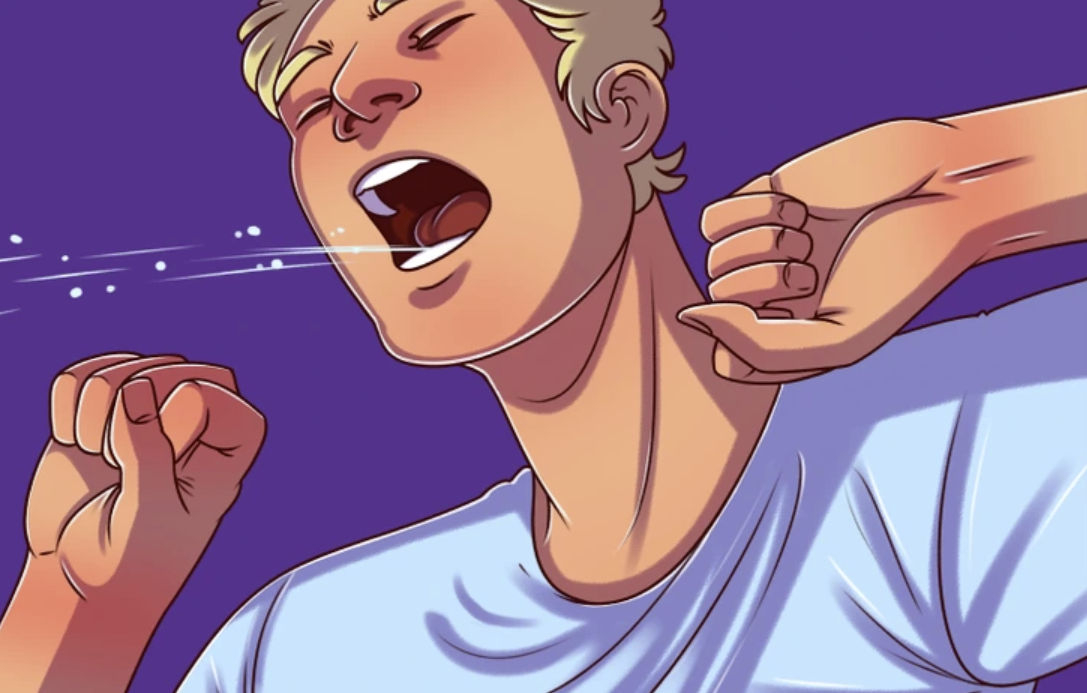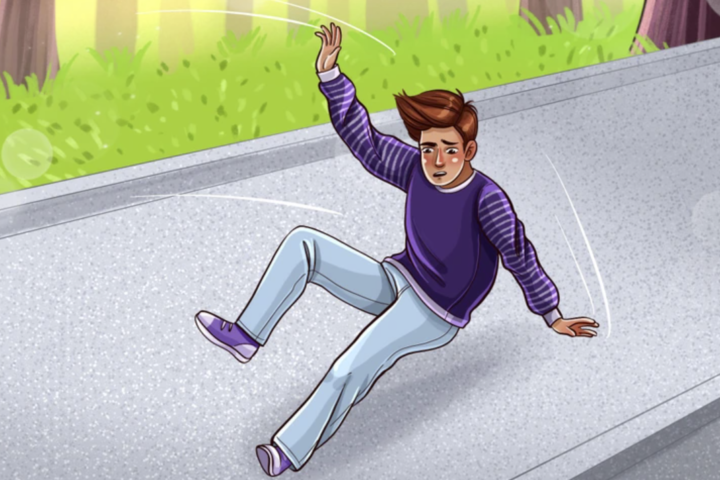Yawning can be an inconvenient and socially awkward phenomenon, often associated with tiredness or boredom. Instead of relying on medications or therapies, we will give you some genius hacks to naturally combat and stop yawning.
These uncommon tips provide alternative approaches to break free from the yawning cycle and help you stay alert and energized throughout the day.
1. Facial Exercises
Engaging your facial muscles through exercises can help prevent yawning. Try raising your eyebrows as high as possible, then lowering them back down. Similarly, stretch your smile as wide as you can, hold it for a few seconds, and then relax your face.
Scrunching your nose and holding the position for a few seconds can also activate the facial muscles. These movements increase blood flow to the face and stimulate the muscles, reducing the urge to yawn.
2. Wash Your Face With Cold Water
A sudden splash of cold water on your face can provide a jolt of alertness and stop a yawn in its tracks. Keep a bowl of cold water nearby, and when you feel a yawn coming on, immerse your face in the cold water for a few seconds.
The shock of the cold temperature stimulates the nerves and wakes up your senses, effectively preventing yawning.
3. Drink Ice-Cold Water to Stop Yawning
Sipping ice-cold water can provide an instant cooling effect that promotes alertness and discourages yawning. Carry a bottle of water with ice cubes and regularly hydrate yourself throughout the day.
The cold temperature of the water stimulates your senses and helps keep yawning at bay.
4. Bite Lemon
Biting down on a slice of lemon when you feel a yawn approaching can interrupt the yawning reflex. The sour taste triggers a reflex response that curbs yawning.
When you experience the urge to yawn, discreetly bite into a lemon slice and hold it in your mouth for a few seconds. The sourness will help stop the yawn from manifesting.
5. Rub Your Hands and Neck
Stimulating your senses can effectively help to stop yawning. Rub your hands together vigorously to invigorate your sense of touch.
Alternatively, use a handheld massager on your neck, shoulders, or temples to provide tactile stimulation.
6. Eat Something Spicy
Eating spicy snacks can provide a natural jolt to your system, preventing yawning. The strong taste and sensation of spiciness awaken your senses, keeping you alert and focused.
Carry a small container of chili flakes or hot sauce with you. When you feel a yawn approaching, discreetly consume a small amount. However, be mindful of your spice tolerance and consume only what is comfortable for you.
7. Challenge Your Brain
Engaging your brain in mentally stimulating activities can ward off yawning caused by mental fatigue. Solve puzzles, riddles, or engage in thought-provoking conversations that require active participation.
Challenging your mind with brain teasers, puzzles, or mental math exercises can divert your attention from yawning. Keep a book of brain teasers handy or download a brain-training app on your phone. Engaging in these activities stimulates your cognitive abilities, keeping your mind sharp and reducing yawning.
8. Scented Energizing Inhaler
Invest in a scented energizing inhaler that contains invigorating essential oils like peppermint, rosemary, or citrus. When you feel a yawn approaching, take a deep inhalation of the revitalizing aroma.
These stimulating scents can awaken your senses, combat fatigue, and help you overcome yawning.
9. Press Your Thumb
Acupressure, a practice derived from traditional Chinese medicine, can be used to combat yawning. Apply pressure to the webbed area between your thumb and index finger using your opposite hand’s thumb and index finger.
Gently massage the point in a circular motion for a minute or two. This acupressure point, known as Hegu or LI4, is believed to stimulate energy flow and promote wakefulness.
10. Power Nap Technique
Instead of giving in to a yawn, try the power nap technique. Find a quiet and comfortable place to sit, close your eyes, and relax. Set a timer for 10-20 minutes and allow yourself to doze off briefly.
The power nap will provide a quick recharge, improving alertness and reducing the need for yawning.
11. Listen to Binaural Beats
Explore brainwave entrainment technology, such as binaural beats or isochronic tones. These audio tracks use specific frequencies to synchronize your brainwaves, promoting alertness and focus.
Listen to these tracks through headphones when you feel a yawn coming on to shift your brain into a more wakeful state.
12. Laugh Out Loud
Laughter is an excellent way to combat yawning and boost alertness. Watch a funny video, read jokes, or engage in a light-hearted conversation with a friend.
Laughter releases endorphins, which are natural mood boosters, and increases oxygen intake, preventing yawning and promoting a state of wakefulness.
13. Sip Green Tea
Green tea contains a small amount of caffeine and an amino acid called L-theanine, which can enhance focus and alertness. Sip on a cup of green tea when you feel a yawn coming on.
The combination of caffeine and L-theanine can provide a natural energy boost and help suppress yawning.
14. Aromatherapy
Certain essential oils, such as peppermint, eucalyptus, or citrus scents, can provide a refreshing fragrance that helps keep you awake and reduce yawning.
Carry a small vial of essential oil with you or use a diffuser in your workspace or home. Inhale the aroma whenever you feel fatigued to invigorate your senses and promote alertness.
15. Physical Activity
Engaging in physical movement or exercise can help combat yawning. When you feel a yawn coming on, stand up and perform a few stretches. Take a short walk or do some light exercises, such as jumping jacks or jogging in place.
Physical activity increases blood circulation, oxygenates your body, and promotes wakefulness, effectively reducing yawning.
16. Focus on Your Breathing
Concentrating on your breath can interrupt the yawn reflex. When you feel a yawn approaching, take a moment to focus on your breath. Take slow, deliberate breaths, and visualize the oxygen reaching every part of your body. By practicing mindful breathing, you relax your body and mind, reducing the urge to yawn.
Altering your breathing pattern can counteract yawning. When you feel a yawn coming on, take slow, deep breaths through your nose and exhale through your mouth.
By consciously focusing on your breath and taking deliberate, controlled inhalations and exhalations, you increase the oxygen intake in your body. This helps replenish oxygen levels, reducing the urge to yawn.
17. Posture Correction
Maintaining good posture can significantly reduce fatigue and yawning. Slouching or sitting in a hunched position restricts your airflow and can contribute to feeling tired.
Instead, sit up straight with your shoulders back and your head aligned with your spine. This posture helps open up your airways, allowing for better breathing and oxygen flow, ultimately reducing the likelihood of yawning.
18. Optimal Lighting
Bright light stimulates the brain and suppresses yawning. Increase the lighting in your immediate environment or step outside into natural sunlight. Sunlight contains blue light, which helps regulate the body’s internal clock and promotes wakefulness.
If you find yourself in a dimly lit space, consider using a light therapy lamp that simulates natural daylight. The increased brightness can help combat yawning and promote alertness.
Bonus: Alternate Temperature Exposure
Exposing yourself to varying temperatures can effectively combat yawning. When you feel drowsy, switch between warm and cold stimuli.
For instance, enjoy a cup of hot tea or coffee to increase your body temperature, followed by rinsing your face with cold water or applying a cold compress. This alternating temperature exposure stimulates your body, helping you stay alert and stop yawning.
Bottom Line
Yawning can be a persistent challenge when trying to stay alert and focused. By employing these tips, which offer uncommon and innovative approaches, you can naturally combat and stop yawning without relying on medication or therapy.
Experiment with these tips and find what works best for you. Stay proactive in your battle against yawning and make these strategies a part of your daily routine to break free from fatigue and maintain an energized state throughout the day.









